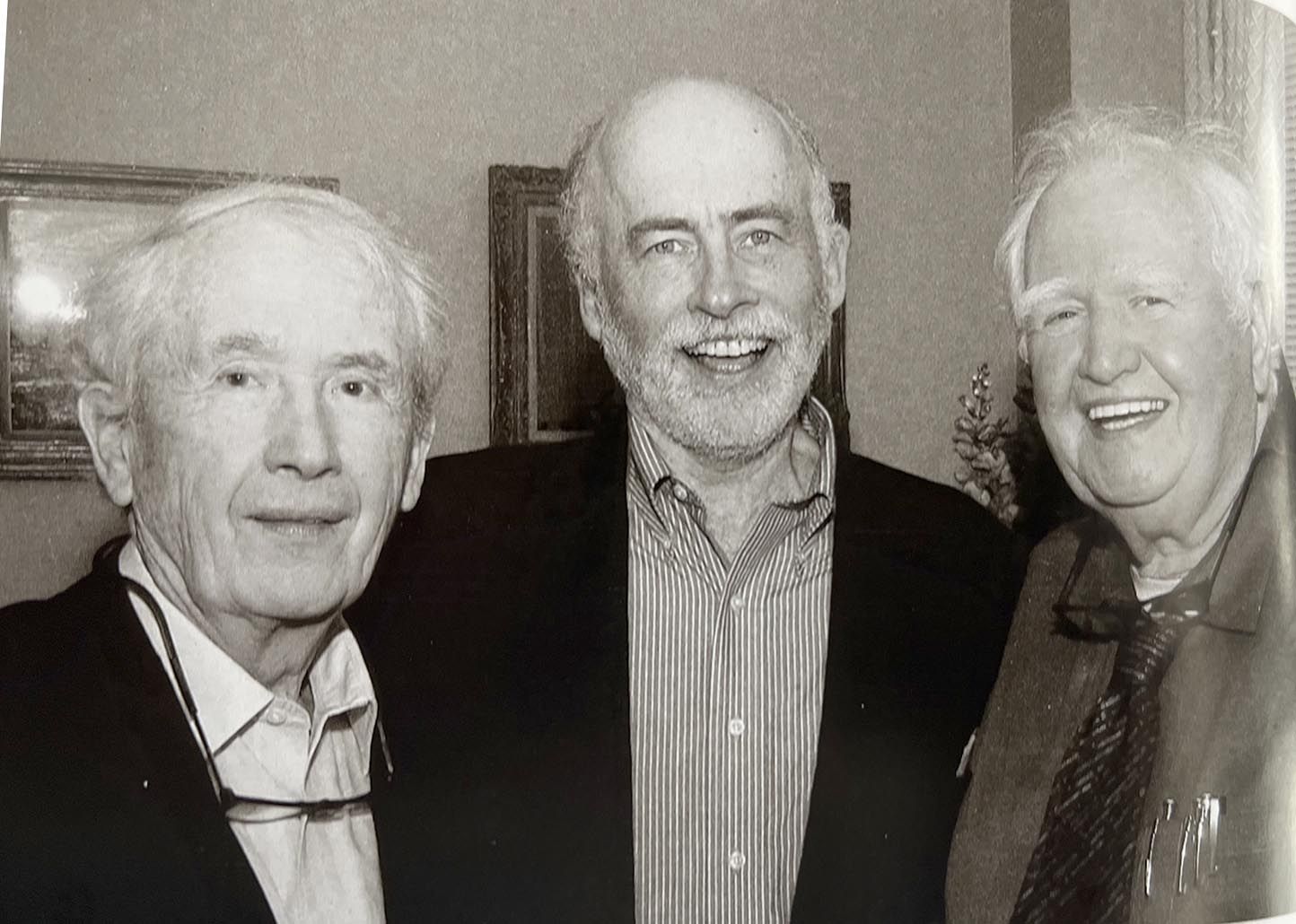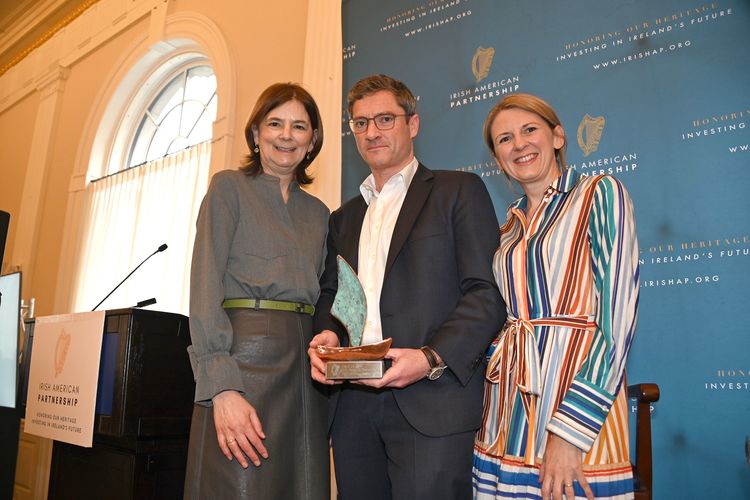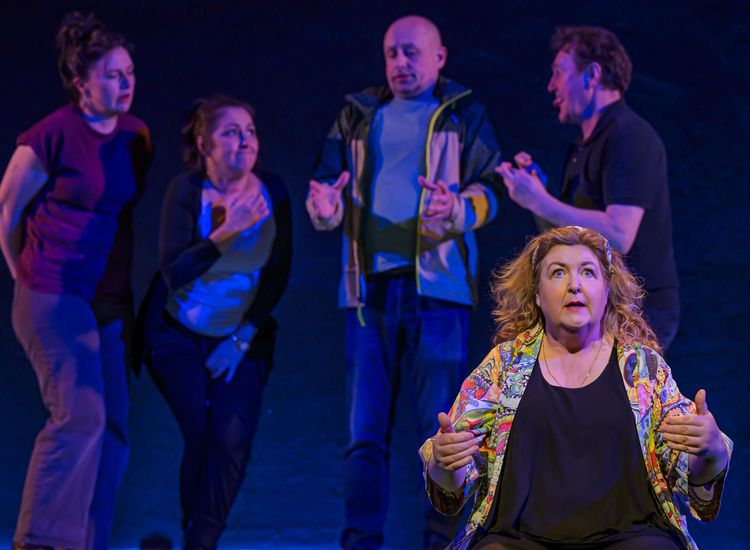Authors Peter Quinn and Malachy McCourt were close friends and literary collaborators for many years. As a tribute to Malachy, who died last week, Peter here offers the introduction he wrote for the re-issuing of Malachy's bestselling "A Monk Swimming."
Malachy McCourt is an Irishman of multiple dimensions. He approaches life with the fabled courage of the indomitable Cuchulainn. He exemplifies the rebellious spirit of Roddy McCorley and Robert Emmet. He’s an orator on a level with Padraic Pearse and Jim Larkin. He’s devilishly funny and writes like an angel. Born to a witty, storytelling people, he’s the wittiest of all. A self-proclaimed atheist, he’s rescued more lost souls than anyone since St. Patrick.
Malachy is one of Limerick’s unduplicatable McCourt brothers. They didn’t put their hometown on the map, but they added a luster unseen since the Vikings set up camp. The first to ship out to America, Malachy quickly became a fixture of New York’s energetic social scene and endowed the city - and the world - with the singles’ bar. Generations of tryst-seekers and spouse-hunters are in his debt. His siblings followed soon after.
Maybe it was genetic, maybe something in the Limerick air, but in their several autobiographical accountings, the McCourt brothers’ cumulative achievement has no parallel. Frank’s colossal bestseller Angela’s Ashes took the literary world with hurricane force.
Alphonsus Joseph (“Alfie”) McCourt’s wry, gentle spirit was reflected in his book of lyrical reminiscences, A Long Stone’s Throw. Brother Mike lifted himself into San Francisco’s pantheon of notables with his nonpareil skills as storyteller and mixologist.
Malachy made his best-selling contribution to the brothers’ oeuvre with A Monk Swimming, the rollicking, hilarious, moving story of one man’s long day’s journey into light. Don’t be fooled by the title. There are no aquatic clerics in these pages. Instead, there are the adventures of a multi-talented actor, rebel, raconteur, comedian and autodidact.
Malachy makes no secret of the demons he’s wrestled with. He has well-earned regrets, but no self-pity, or excuses, or blaming others. In his bestsellers A Monk Swimming and its sequel, Singing My Him Song, he offers the man in full, warts and all. He makes us laugh as well as shake our heads. He neither embellishes his exploits nor camouflages his transgressions. In all things a truth-teller, he is that elusive rarity that Diogenes scoured the streets of Corinth for - an honest man.
Lest I be accused of failing to admit my opinions of Malachy are colored by our four decades of friendship, I freely and proudly admit I’m among the legion privileged to enjoy many memorable hours in his company.
But even if I never met Malachy, my views on his life and literary output would be the same.
“Malachy made his best-selling contribution to the brothers’ oeuvre with A Monk Swimming, the rollicking, hilarious, moving story of one man’s long day’s journey into light. Don’t be fooled by the title. There are no aquatic clerics in these pages. Instead, there are the adventures of a multi-talented actor, rebel, raconteur, comedian and autodidact.”
Fortunately, one enchanted evening I wandered into the appropriately named Bells of Hell, a West Side watering hole patronized by the good, the bad, and the undecided.
Across a crowded room, I spied a circle of patrons enrapt by the soliloquy of the story-spinning proprietor. I immediately recognized Malachy from his frequent, hugely entertaining TV appearances. I almost left without introducing myself, but after seeing him on screen, I wanted to say hello in person.
A man of legendary accessibility and affability, he quickly engaged me in a conversation that ranged from a poetic appreciation of Marlene Dietrich’s allure to a stinging indictment of British imperialism. Like Captain Louis Renault in “Casablanca,” I told myself that “this could be the start of a beautiful friendship.” So it proved to be.
Malachy in a 2011 photo.
Over the years, my appreciation of Malachy’s talents has ripened into deep and abiding admiration. I had the chance to watch his performances in a variety of venues. Frank and Malachy’s two-man show “A Couple of Blaggards” won plaudits and entertained audiences from New York’s Irish Arts Center to venues in Chicago and San Francisco.
Malachy’s solo performance of Plunkitt of Tammany Hall brought to life one of the most roguish, candid and hilarious of Gotham’s political scoundrels. Among his litany of gigs and engagements, who can forget the bold run Malachy made for New York governor?
Unsurprisingly, he suffered the fate of candidates who insist on telling it like it is and sticking to the facts. He lost. But soon after the election, the state’s voters experienced a serious case of buyer’s remorse when his opponent’s surreptitious addiction to prostitutes was exposed.
A mutual friend once described Malachy as “a man of such profound conviviality he could draw a tombstone into conversation.” Testament to his power to engender high-spirited dialogue is his founding role in the First Friday Club (FFC), a disparate collection of wanderers, writers and wannabe writers who gathered each month at Eamonn Doran’s for a lunch of grub, gab and grog.
The FFC was based on a religious devotion many of us knew from our childhoods which promised that, for those who attended Mass nine consecutive First Fridays, a priest would be present at their deathbed to hear their confession. In Malachy’s version, those who showed up for nine lunches in a row would be assured the presence of a bartender to offer a parting glass.
A topic of increasing attention among the faithful of the FFC was the novels of William Kennedy, winner of the Pulitzer Prize and National Book Award for Ironweed, the third in his trilogy of Albany novels. Overnight, Kennedy made the state capital famous for more than legislative shenanigans and a legendary political machine whose operating principle was summed up in the motto “Honesty is no substitute for experience.”
Malachy reading James Joyce.
Malachy argued that it was worthwhile for the FFC to travel to Albany and invite Kennedy to lunch. Since I was in Albany at the time working for the Governor, I was charged with extending the invitation. To my surprise, Kennedy immediately accepted.
He subsequently confessed that he imagined the FFC as a band of senior-citizen littérateurs eager to explore Jungian nuances in Ironweed. If they were willing to take the mid-winter, three-hour train ride to Albany, he thought that the least he could do was let them buy lunch.
With Malachy in the lead, the FFC, some of whom had never been north of Poughkeepsie, boarded Amtrak for the trek to the capital. It turned out a hilarious, outrageous, epic afternoon of jokes, ballads and dueling soliloquies.
Kennedy laughed until he wept and barely got a word in. What I most remember from that memorable day is Malachy standing at the head of the table. As the pinched, pink light of a late winter afternoon faded in into dusk, he delivered an alternately side-splitting, deeply moving commentary on the sorrows and triumphs of an immigrant’s journey from the narrow, dreary lanes of Limerick to the broad, glittering thoroughfares of New York.
He quickly discovered, he said, that while the streets weren’t paved with gold, they offered something even more precious: the chance to fly past the same nets as fellow exile James Joyce, to find his own way, seek his own truths, follow his own dreams and shape his own destiny. Whether in person or in his books and performances, in private as well as public, Malachy has touched people with his generosity and wit.
His life is a testament to the power of the human soul to endure, overcome and never lose hope. His friendship is a grace and a gift for which I will be forever grateful.










